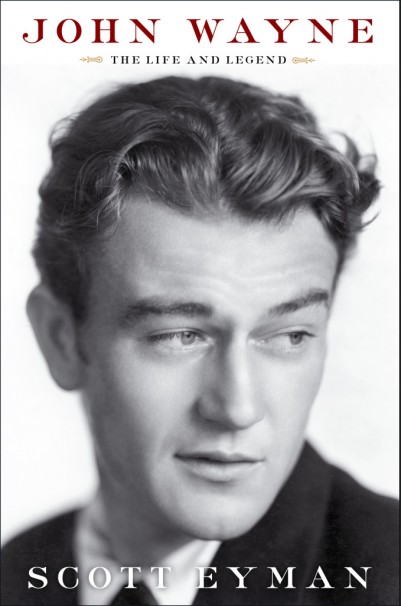
When film historian Scott Eyman published his comprehensive biography, John Wayne: The Life & Legend, in 2014, John Wayne, who died in 1979, was long since a controversial figure — and a polarizing one. But surely never in Eyman’s imagination could he predict that six years hence, the Democratic Party of Orange County, California, would make a concerted effort to remove Wayne’s name from the erstwhile Orange County Airport, and return the facility to its much-less-colorful original name.
Wayne ruffled feathers with his uber-right-wing politics starting in the McCarthy era, through the Cold War and, then, with guns blazing, into the Vietnam era. The last time I checked, Americans are allowed to hold, and express, opinions. Opinions are just ideas put into words. Words that can hurt, offend, and may be better left unsaid; and yet, we are allowed to express our beliefs. Things went over the top for Wayne when he gave a scabrous and incendiary interview to Playboy magazine in May 1971. As a men’s magazine (Wayne was a man’s man) Playboy was a fitting bully pulpit for the Duke. But whoa, should this guy ever have hired a media consultant before giving this interview!
Since we are very much in the heat of our own political moment, I thought I would pluck some plum elements of author Scott Eyman’s measured take on the Playboy interview. Again, his words were written not in the current zeitgeist. That adds to their credibility in my eyes.

Eyman opens the Playboy-interview era by noting the wide range of television appearances John Wayne was making in the early 1970s, on programs as disparate as Rowan and Martin’s “Laugh-in”; a CBS special called “The American West of John Ford”; and a 90-minute special called “Sing Out, Sweet Land” in which his co-stars were such television royalty as Lorne Greene, Lucille Ball, Dan Blocker, Bob Hope, Ann-Margret, and Dean Martin. Every reminiscence of production staff Eyman interviewed from these projects praised Wayne’s professionalism, courtesy, and enthusiasm, although one producer noted, “Of course, he was to the right of Charlemagne.”
Eyman describes how Wayne was, on the one hand, constantly badmouthing “fucking politicians,” but on the other, was a “politically committed person” who was “obsessive” about the “deadly path America was on.” (Sounds like today!) Eyman sprinkles juicy Wayne soundbites some of which sting with their intolerance (he lambasts Jane Fonda and Tom Hayden for their views, and actions, on Vietnam). Others seem fully reasonable, middle-of-the-road opinions, and they are honest, for example:
“I have always felt that women should get exactly the same salary for the same work that a man would. And I assume and presume that is gradually coming to pass. Mainly because women have been individual enough to step out and become lawyers and do these different things. But I think it’s ridiculous for the studio to have a woman be a grip on a set … [he describes the physical strength needed for that job]. That doesn’t mean that she couldn’t direct the picture if she had the talent to do it.”
John Wayne on the Women’s Movement
“When we came to America, there were a few thousand Indians over millions of miles, and I don’t feel we did wrong in taking this great country away from these people, taking their happy hunting ground away. We were progressive, and we were doing something that was good for everyone.”
John Wayne on Native Americans
Again, these are words. Ideas. His right to have and hold them. But along came the Playboy interview, with sound bites like this:
“With a lot of blacks, there’s quite a bit of resentment along with their dissent, and possibly rightfully so. But we can’t all of a sudden get down on our knees and turn everything over to the leadership of the blacks. I believe in white supremacy until the blacks are educated to a point of responsibility. I don’t believe in giving authority and positions of leadership and judgment to irresponsible people.”
Eyman’s comment? “That was just for starters.” He writes that “Wayne had voiced many, if not all, of these opinions in print before, but not in the pages of Playboy at the height of its influence.”
“The Playboy piece inflamed the bruises left by The Green Berets,” writes Eyman, “although it was an amplification and a distortion of Wayne’s feelings.”
How so?
Eyman cites the complexity of Wayne’s views, among them his belief that where black civil rights are concerned, “George Wallace is part of the goddamn problem, not the solution.” That’s hardly a courageous stance, but there it is. Eyman provides context: “It hardly needs to be pointed out that Wayne was a man of his time, embodying the attributes of a small-town Edwardian boyhood and a good many of the prejudices as well.”
John Wayne’s sense of fair play was paramount:
“I didn’t know about Jews, niggers or Japs as minority groups until I went to college. At Glendale High, we had ‘em all and on the football team if any guy called the Japanese fellow a Jap we took him off the field. But not until the bunch of us took our turns at ‘em. We all shared the fact that we were poor and struggling and there wasn’t time to show prejudice. We only felt together.”
Eyman calls Wayne a “true democrat” with a lowercase “D,” and cites his “frontier values,” noting that after the Playboy interview journalists increasingly lobbed provocative politcal questions at Wayne, who tended to comply and take the bait.
As a film historian, Eyman expresses his own regret that “Wayne’s politics made it easier for those who didn’t share his beliefs to refuse to engage with the truths he told as an actor.” He cites the likes of Pauline Kael calling Wayne “so archaic it’s funny.” At the same time, Joan Didion wrote poetically, “When John Wayne rode through my childhood, and perhaps through yours, he determined forever the shape of certain of our dreams.”
Eyman concludes by recognizing that these “dueling dialogues” about John Wayne’s value and meaning “continue in another century, with the subject long dead.”
Well stated.
Excerpted from Scott Eyman’s “John Wayne: The Life and Legend” (New York: Simon & Schuster) 2014, chapter 22
